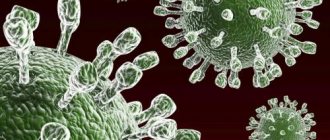Why does a child poop often?
Every parent has at least once encountered the fact that their child poops frequently. They begin to worry about the child's frequent bowel movements, especially if it is the first and long-awaited one. Let's figure out together why the baby experiences frequent urges to go to the toilet and what the consequences are.
About the child’s excretory system in the first six months of life
The frequency of going to the toilet in the first 6 months of life is associated, first of all, with the mother’s nutrition, if the child is breastfed, or with an adapted formula, if he is artificial.
When breastfeeding, the baby can poop 7 or 8 times a day and this fact is considered the norm.
You should also not worry if he does this less often, but does not experience any unpleasant sensations (does not puff, does not push).
Mothers who plan to feed their child for a long time should watch what they eat, because some foods have a laxative effect (apricots, plums) and, passing through milk to the baby, weaken the immature gastrointestinal tract, which is why the child poops often.
If a child is fed formula, his stool is usually thicker and darker than that of those who feed on mother's milk and he may poop 1-3 times a day, which is considered normal. The main thing is that the discharge is homogeneous and does not have an unpleasant odor.
We should also talk about the baby’s stool in the first days of life. After birth, you may notice black stool passed, which is called meconium. Pediatricians don’t see anything wrong with this; after a while, the discharge will lighten and become of a uniform consistency.
What happens to the stool after the introduction of complementary foods
After about six months, babies begin to be slowly introduced to adult food. By 7 months, most babies are already familiar with some vegetables and fruits. If your child often walks around, start introducing your child to cereals that are a little firmer.
Starting with the introduction of complementary foods, children go “big” less often, about 5 times those who are breastfed and 2-3 times those who are bottle-fed; with the help of complementary foods, you can adjust the frequency of going to the toilet (fruits help you cope with constipation, and porridge - with frequent urges).
A child poops often: how to react and what to do?
Above we talked about the standards that a baby should fit into. You need to start sounding the alarm if your child poops more than 10 times a day. Changes in color and consistency are also a cause for concern. In this case, you can suspect that the baby has insufficient enzymes.
Sometimes, in case of gastrointestinal dysfunction, they talk about lactose deficiency (lack of the enzyme lactose), in which it is very difficult for the baby to digest breast milk and stool upset occurs - it becomes very frequent and liquid, or, on the contrary, constipation may be tormented. So if your baby poops too often, get a stool test for lactose intolerance to rule out an enzyme deficiency.
In addition to this, pediatricians name several other reasons why a child may defecate too often:
- Diarrhea, or stool disorders, is associated with poor nutrition of the baby. It may be that you gave your child a lot of fruits, which weaken the intestines. This condition can be corrected at home by giving your child anti-diarrhea medications. If diarrhea persists, it is better to consult a pediatrician. Remember that diarrhea for an infant can be very dangerous, so give him water as often as possible, adding a drug like rehydron to the water, which prevents salts from being washed out of the body.
- Intestinal infection. If, in addition to diarrhea, the child also has a fever, you should immediately show him to a doctor. If left untreated, an inflammatory process may develop due to bacteria entering the cracks of the rectum.
- Dysbacteriosis. A fairly common phenomenon characterized by a sharp decrease in “good” bacteria. With dysbacteriosis, an unpleasant odor, loose stools, and undigested pieces of food are observed. You need a doctor's consultation and proper treatment.
Treatment of frequent bowel movements in children
Even the most experienced doctor will not be able to determine by eye why a child has frequent or loose stools. To do this, you will have to undergo some tests. After receiving the results, the doctor will determine whether the child needs treatment.
If the test results show nothing wrong, then you should calm down and stop counting the number of times you need to go to the toilet. It’s another matter if an intestinal infection is detected. In this case, the doctor prescribes treatment that can be done at home.
If lactose deficiency is detected, the doctor will prescribe special enzymes and recommend a diet to improve the situation. A deficiency of one or another enzyme in a baby under 1 year of age is considered normal, since his digestive system is not perfect and will become fully operational over time.
How should a baby poop after 1 year?
After a year, the child usually has regular bowel movements, but parents should also monitor the color, consistency and smell.
At 3 years old, we can already say that the child’s gastrointestinal tract has matured and is working at full capacity, but is still different from an adult. Therefore, if there is the slightest change in stool, it would be a good idea to consult a doctor.
Monitor your child's health and then you can avoid many problems later.
Source: https://kidsman.ru/zdorove/rebenok-chasto-kakaet
Frequent bowel movements in small portions in adults – Human Parasites
There are some reasons why an adult may experience frequent bowel movements, but not diarrhea.
Every person should know these reasons so that an unpleasant situation does not arise. The cause may be inflammatory processes in the rectum, the patient begins to experience quite strong pain and frequent bowel movements.
At first, the urge is controllable, but a little later, bowel movements begin to occur involuntarily.
In a large number of people, there is a small production of enzymes (digestive), this deviation is directly related to the disturbances that have occurred in the functioning of the pancreas.
For proper digestion, the body needs a sufficient amount of enzymes. Due to a lack of enzymes, some of the foods consumed are not digested and this provokes frequent visits to the toilet.
If a person has frequent bowel movements, the reasons may lie in the following diseases:
- gastritis;
- pancreatitis;
- colitis;
- cholecystitis.
A person is tormented by feelings of heaviness in the stomach, flatulence, and this contributes to a frequent urge to go to the toilet.
This disease is quite difficult to identify; often with irritable bowels, a person often feels the urge to go to the toilet immediately after eating. There are times when the patient does not have time to finish the meal when he feels the urge.
With this disease, stool may change its consistency, but loose stools occur infrequently.
When consuming fiber in large quantities, the problem of frequent bowel movements may arise. When you change your diet, the number of daily urges to bowel movement will change.
Poor nutrition also causes this unpleasant phenomenon.
If a person consumes a large amount of raw fruits and vegetables, the intestines begin to work much faster and this provokes frequent bowel movements. This problem most often occurs among vegetarians.
For any reason, there is an increase in not only frequent bowel movements and a change in the color, consistency and smell of feces.
Frequent bowel movements in an adult can occur due to frequent nervous shocks. The nervous system greatly affects the digestive system and people exposed to frequent stress suffer from frequent urge to go to the toilet.
Constant bowel movements may indicate the following abnormalities:
- feeling of fear and being in an unstable emotional state;
- schizophrenia;
- constant stress and irritation;
- a large number of difficulties arising at one time.
If the nervous shocks that have occurred are not resolved in time, the body begins to react inadequately, and the person experiences frequent bowel movements. Often people who take everything to heart in this situation begin to think that they have various diseases and this further aggravates the current situation.
To eliminate this situation, you need to:
- consult a doctor (psychologist) to help get rid of stressful situations;
- Some citizens can take anti-depression pills for a while.
As soon as the problem can be identified and solved, the person ceases to be tormented by constant bowel movements.
DOCTORS RECOMMEND!
Many patients want to find a gentle remedy for cleansing or preventing parasite infection. This preparation contains a complex of selected herbs to combat a wide variety of parasitic organisms.
The herbal drug successfully relieves inflammation, cleanses the body, neutralizes pathogenic bacteria, viruses and fungi.
Diarrhea - pasty or liquid stools. It can be from five to twenty times a day. In this case, the body can lose up to 95% of fluid - this can lead to dehydration.
So, the possible reasons are:
- incorrect dietary intake;
- starvation;
- use of untested folk remedies;
- eating foods that contain fiber;
- binge eating. In particular, this includes fatty foods, various carbonated and intoxicating drinks. In order to stop diarrhea, you just need to give up everything previously listed;
- uncontrolled treatment with antibiotics. For those who do not know, their long-term use, and especially not coordinated with a specialist, can cause frequent bowel movements in an adult;
- toxic infection. Food poisoning is caused by toxins. They are produced by bacteria that are outside the body. A certain group of pathogenic microorganisms are killed by boiling, but, unfortunately, not all. They are most often found in creams, meat, milk and other protein products. Diarrhea is accompanied by nausea, chills, vomiting, and stools are foamy and watery.
Diarrhea can be osmotic or exudative. The first property is characterized by impaired absorption of fluid, and the second by the content of mucus, pus, and blood in the stool.
Loose stools are a condition in which the consistency becomes soft and unformed. In this case, water makes up more than 70% of the total volume of feces. The disorder tends to become chronic and persist for a long time. The difference is that the patient feels the urge to defecate more than three times a day.
Frequent bowel movements differ from acute forms of diarrhea in adults by accompanying symptoms.
In addition to changes in the consistency and color of stool, nausea, vomiting, increased body temperature, dizziness, and pain in the abdomen and stomach are observed. During the day, the urge occurs from 4 to 20 times during the day.
The reason is that the percentage of water in stool increases to 60-90%. Contains mucus, undigested food, minerals, bile pigments, bacteria.
Diarrhea develops due to poisoning with medications, infection with rotavirus, salmonellosis, dysentery, or consumption of poisonous and poisoned foods.
Regardless of the nature of the problem, you should consult a doctor. Examination and laboratory tests will help make a diagnosis and choose appropriate treatment.
Everyone is at risk of developing chronic loose stools. Frequent bowel movements without diarrhea can be caused by:
- Disturbance in the functioning of the gastrointestinal tract. Multiple urges to empty the bowels, flatulence, and a feeling of heaviness in the abdomen torment patients with pancreatitis, cholecystitis, gastritis, and colitis.
- Enzyme deficiency. Most adults experience insufficient production of digestive enzymes; some foods are not digested and come out in pieces. The disorder is caused by pathology of the pancreas.
- Wrong diet. Scientists and doctors urge people to pay attention to food. Changes in eating habits, increasing the consumption of fiber, dietary fiber, and avoiding meat can cause stool thinning.
- Irritable bowel syndrome. A difficult disease to diagnose. Problems begin immediately after eating; sometimes the patient is unable to finish the meal due to the appearance of urges. The difference is that stool can change from liquid to mushy.
- Psychological reasons. The nervous system affects the functioning of the body and the digestive system. In an adult, the disorder can begin against the background of emotional tension, anxiety, and stress. Treatment should be provided by a psychotherapist.
- Alcohol consumption.
- Colon cancer. The disease is dangerous and affects the cells of the mucous membrane of the large intestine. Often the only cause is bloody diarrhea or constipation.
- Gluten intolerance. Associated with malabsorption of foods containing gluten. The danger lies in the fact that gradual damage to the mucous membrane occurs; during defecation, loose, pale-looking feces with various impurities and an unpleasant, pungent odor are released.
- Hyperthyroidism. The thyroid gland produces excess amounts of hormones, which speeds up metabolism. Increases the frequency of trips to the toilet, causes weight loss with increased appetite.
- Taking medications. Many medications have diarrhea as a side effect.
- Pregnancy. During this period, frequent bowel movements are a physiological feature. Most often observed at the end of the third trimester. The body cleanses itself in preparation for the birth process. Drug treatment is not necessary.
- Pathologies of the liver and gall bladder in an adult. A large amount of bile enters the rectum, which causes liquefaction of the stool. Signs: pain in the right hypochondrium, yellow-green color of stool.
- Chondrosis. Pressure on nerve roots and pressure on internal organs can cause a reaction - constipation or diarrhea.
- Kidney failure. Increased frequency of urges is observed in the last stages of uremia. The masses are dark in color and have a specific smell. Inflamed kidneys cause fever and vomiting.
All described conditions require medical examination.
Diseases and various disorders can occur in adolescents, older people, and adults. Pensioners are at risk due to decreased physical activity and age-related changes in the body.
It is necessary to correctly identify the causes of frequent bowel movements and eliminate them.
The boundaries of normality and pathology fluctuate. Normally, the frequency of bowel movements in an adult is from 1 to 3 times. But during the menstrual cycle, during pregnancy, after taking alcohol or medications, an increase in the number of urges may be observed. Temporary disruption is not dangerous and is beneficial; the body cleans itself on its own.
Against the background of deficiency, vision may deteriorate, bones lose strength, hair falls out, the anus begins to hurt and bleed.
Frequent bowel movements after each meal of solid food threatens the development of dehydration.
Diarrhea in an adult can be a consequence of disturbances in the functioning of internal organs. the reason is a reaction to a food allergen, for example, milk, sugar substitutes, flavorings.
If feces are stored for a long time, it is necessary to undergo an examination to exclude various types of pathologies of the digestive system, peptic ulcers, and other dangerous conditions.
Do not delay your visit to the doctor, the doctor will help you maintain your health, normalize your stool, and choose effective treatment.
Source: https://gb4miass74.ru/diareya/chastyj-stul-prichiny.html
How often should a baby poop with different types of feeding?
All parents should know how many times a day a newborn should have bowel movements, as this is one of the most important signs that everything is fine with the baby’s health. You need to pay attention not only to the number of stools, you should also monitor the consistency, presence of impurities, color, smell and volume of stool.
Changing a baby's diaper
How much and how does a baby poop
There is no clear answer to the question “how many times should a newborn breastfed baby have stool?” The number of bowel movements per day depends on the volume of feces that is in the baby’s large intestine and presses on its walls.
Very often there are situations when a baby cannot poop for one or two days, and then begins to defecate more than 3-5 times a day. This is normal, provided that the baby feels well, is cheerful and active, and does not have obvious symptoms of constipation. As long as the newborn has a soft belly, a good appetite and good sleep, there is no need to worry.
Note! The frequency of bowel movements is an individual indicator for each infant. How many times a day one baby poops is absolutely not normal for another.
Normal number of bowel movements during breastfeeding
In a newborn breastfeeding, the process of defecation most often depends on the diet of the nursing mother. If she adheres to the basic rules of nutrition, then the baby’s stool will be frequent, yellow, mushy, without any inclusions.
If you do not adhere to the correct diet and consume an excessive amount of food rich in carbohydrates, then the child will begin to ferment, the stool will become liquid, foamy, and his stomach will swell and rumble.
The frequency of bowel movements depends not only on nutrition, but also on the age of the child.
Newborn suckling
First 2 days after birth
During this period, all newborns begin to pass the original feces - meconium. The number of bowel movements is 6-10 times a day. Everything will depend on the individual characteristics of the digestive organs and their fullness.
Third to seventh day
If the original feces come out completely, then the baby may not poop at all. Normal poop occurs only after all the meconium has passed. As a rule, in the first week after birth, babies poop no more than three times a day.
Second week
Starting from the second week, the process of breastfeeding and, accordingly, the baby’s digestion are gradually improving. During this period, newborns may poop irregularly, which is considered completely normal. Defecation occurs up to 10 times a day.
Three to five weeks
From the third week, the baby begins to poop after each feeding or before it. Some babies do not have bowel movements as often. All babies are different, a lot depends on the digestive organs of a particular child.
Important! If a baby cannot poop for a long time, his face turns red and tears flow, you should consult a doctor about this.
One and a half months
In a 1.5 month old baby, the frequency of bowel movements is significantly reduced. Your baby may not poop as often as before. He can go to the toilet once every three days. During this period, the lactation process changes; the child begins to produce other protein substances that are involved in the process of breaking down food.
Two month
How much should a 2 month old baby poop? During this period of a baby's life, all digestive organs begin to adapt to feeding. A two-month-old baby may not poop as often or may continue to have bowel movements as usual.
Six months
At six months, the child’s body already produces the required amount of important enzymes, so many mothers at this age begin to introduce complementary foods. As a result of the introduction of new products, the color, consistency and smell of feces change. The six month old baby can now poop once or twice a day.
Stool during artificial feeding
Newborn babies on willow may not poop as often as babies fed only on mother's milk. This is because any formula milk takes much longer to digest in the baby’s intestines than breast milk.
Most often, the same formula will work here as for babies on EB: the number of times the baby eats, the number of times he poops.
Since the formula is higher in calories, it is not given to newborns as often as breastfeeding; accordingly, an artificial baby will poop less often.
Newborns fed formulas may often suffer from constipation and irregular or loose stools. This is all because the child’s immature intestines do not have time to adapt to the new composition of artificial nutrition, and disruptions begin in the process of defecation.
Bottle feeding
Mixed feeding stool
The poop of mixed-fed newborns has a mushy consistency and an unpleasant odor. Such babies poop once or twice a day, but sometimes less often. Constipation and diarrhea occur very often, since the intestines cannot completely mix, digest and absorb the milk formula. It is important for parents to choose the right food according to the age of the child.
Additional Information. If your baby doesn't poop very often, but the stool remains soft, there's no need to worry. If the stool is very hard, the baby has to strain hard to defecate, his face begins to turn red, he cries during the bowel movement, you need to consult a doctor so that he can help replace supplementary feeding.
Diet-related stool changes
The frequency, volume, structure and color of stool depend on what exactly the baby eats.
Fecal frequency
How much should a newborn baby pee per day?
5-7 hours after birth, newborns pass their original feces (meconium). Then they may not poop for 2-3 days. Starting from the fifth day, infants poop from once every two days to ten times a day. Usually the process of defecation occurs during sucking or immediately after it.
How many times a day should a 2 month old baby poop? An older baby will not poop as often. Typically you have bowel movements three to five times a day. At six months, a child can poop two to three times a day, at one year - once or twice a day.
If the baby poops once a day, then this regime will continue, only the structure will change (the poop will become harder).
Stool volume
The volume of feces will depend on how much food the child ate the day before. Newborns of the 1st month of life do not poop very much - about 20 g per day. From six months, the volume of bowel movements will increase to 35-40 g per day.
Density
For a newborn, both soft, mushy stool and liquid stool are considered normal. The poop may also be quite thick, which is also normal. By the age of one year, the feces are already practically formed, but quite soft and plastic.
Color
Normally, newborn stool can be of different colors: yellow, golden, yellow-green, yellow with white lumps, brownish and green. All these shades can be observed in children undergoing breastfeeding; after breastfeeding, the stool darkens and turns brown.
Smell
In children on breastfeeding, the feces have an unusual, slightly sour smell. If a child eats formula, his stool will have a not very pleasant, slightly putrid or rotten aroma.
Interspersed
Newborn babies may contain various impurities in their stool; this is considered normal. Impurities can be:
- White lumps. They appear due to the fact that the baby, due to the immaturity of the gastrointestinal tract, cannot fully absorb milk;
- Undigested food. Appears during complementary feeding and is considered normal for age-related changes. This also happens due to the fact that the baby may not yet be ready to consume the introduced foods;
- Slime. This is a normal phenomenon, since it protects the gastrointestinal tract, you should not be alarmed by its appearance in the child’s stool.
Important! Parents should be wary if there is pus and bloody streaks in their child’s stool. This is a bad sign, you need to urgently show the child to the doctor.
Poop in a baby's diaper
How to determine bowel irregularity
How much should a 1.5 month old baby sleep?
Irregular bowel movements are when healthy bowel movements are replaced by constipation or diarrhea, and constipation is also replaced by liquid feces.
How to understand that a baby has irregular bowel movements:
- The baby begins to rarely poop, the intestines do not empty for more than a day;
- Defecation is accompanied by loud screams and crying;
- The baby is very restless when he tries to poop;
- The consistency of stool changes. There may be loose stools at first, then very hard ones.
What to do in this case:
- Mom needs to reconsider her diet, remove all errors in food;
- Avoid overfeeding the child;
- Offer your baby food only in accordance with his age.
Important! If, after following all the recommendations, bowel regularity is not achieved, you should consult a doctor.
Exercises to prevent constipation
What to do when you have problems with stool
How long should a newborn breastfeed?
If the child has hard poop, or during the process of defecation he strains a lot, and it is difficult to poop, then the whole reason is constipation.
What parents should do:
- Review the diet of a nursing mother if the baby is fed breast milk. She needs to exclude from the menu all foods that cause excess gas.
- A bottle-fed baby may have to change formula. You need to choose one that does not contain palm oil, as it causes constipation.
- Massage your tummy and use a warm heating pad.
- Consult your doctor; you may need to take bifidum medications and use glycerin suppositories.
If your baby is bothered by diarrhea, you need to follow certain recommendations for nutrition and treatment of digestive disorders. What do we have to do:
- Use laxatives that will allow you to empty your bowels regularly.
- Use glycerin suppositories or microenemas.
- Change mom's diet. She should eat more fresh vegetables and fruits.
- Transfer the child to another milk formula. Perhaps the pediatrician will recommend giving the toddler a fermented milk mixture to normalize stool.
- Change your drinking regime. Some pediatricians recommend supplementing your child with water. This will avoid dehydration and improve the digestion process.
Massage to help relieve constipation
When you urgently need a doctor
There are conditions in which you need to urgently consult a doctor. These include:
- The child was found to have black stool;
- The newborn began to have diarrhea and incessant vomiting;
- The baby poops white-colored feces;
- There is blood in the stool;
- When you try to poop, pink mucus comes out of your butt;
- The baby's general condition has deteriorated significantly due to stool problems.
Parents need to be very concerned about the health of a baby up to one year old, because he is so defenseless and susceptible to various diseases. His organs are not yet fully mature and work differently than those of adults. It is important to recognize the existing problem in time so as not to harm the baby’s body.
Source: https://kpoxa.info/zdorovie-pitanie/skolko-raz-den-stul-novorozhdennogo.html
The child has frequent bowel movements, but not diarrhea
inflammation
The appearance of stool, its consistency, smell - all these are the most important indicators of the primary diagnosis of pathologies of the digestive system. In addition to the consistency of feces, stool frequency is also of great importance in assessing the child’s health. Normally, a child over three years old should have a bowel movement once a day.
For infants, this norm is several times higher and can range from 3-4 to 8 times a day (depending on the age of the baby).
If the stool has a thin or watery consistency, accompanied by intestinal spasms, tenesmus (false urge to defecate), the child is diagnosed with diarrhea, which most often has an infectious nature.
Characteristics of children's stool play an important role in the initial diagnosis
In some cases, it happens that a child goes to the toilet several times a day, but there are no signs of intestinal infections .
Sometimes such changes are associated with the characteristics of the children's diet and the abundant consumption of certain foods, but in half of the cases the cause of frequent bowel movements is diseases of the gastrointestinal tract and disturbances in the functioning of internal organs.
To understand whether frequent bowel movements in childhood are dangerous, it is important to understand the causes of this condition and know their characteristics.
The child has frequent bowel movements, but not diarrhea
The relationship between bowel movements and nutrition
If a child has bowel movements more than 2 times a day, this condition is considered a deviation from the norm, although it can be considered as an individual characteristic of the body.
In newborns and children of the first year of life, the number of bowel movements can reach up to 6-8 times a day (if the child is breastfed) and up to 4-5 times a day if the child receives an adapted milk formula as the main diet.
The frequency of bowel movements in infants decreases slightly after the introduction of complementary foods: this usually occurs at 7-8 months. After a year, the child can defecate from 4 to 3-4 times a day.
Frequency of newborn bowel movements
The relative norm for children three years of age and older is 1-2 bowel movements per day. If bowel movements occur more often, it is necessary to analyze the child's diet - perhaps the child eats a lot of foods with a laxative effect, containing fiber or stimulating intestinal motility.
All these products must be present in the child’s daily menu, but in limited quantities that correspond to age norms and physiological needs. Foods containing a lot of mucus, which envelops feces and stimulates their evacuation into the rectum, can also cause increased bowel movements.
Sources of mucus
Products that can affect stool frequency in children of middle and older age groups include:
- some types of fruits and vegetables (zucchini, pumpkin, prunes);
- cereals with a high gluten content (oatmeal, wheat, barley);
- fermented milk drinks (bifidoc, acidophylline, kefir, yogurt, whey).
Bananas, rice, brown bread, pears, rice water, and various types of meat have a fixing effect.
Foods that affect stool
Frequent bowel movements due to fermentopathy
This is one of the most common causes of bowel dysfunction in children aged 1 to 7 years.
Enzymopathy is a pathological condition in which a child’s digestive tract does not produce enough necessary enzymes (or they are completely absent).
Enzymopathy also includes insufficient enzymatic activity, which leads to impaired breakdown and absorption of nutrients and slower absorption.
Enzyme therapy
Signs of enzyme deficiency in children include:
- frequent stools, the consistency of which can vary throughout the day from watery liquid to a dense sausage shape;
- pungent odor of feces (explained by rotting products of incomplete breakdown of proteins, fats and other elements);
- an increase in the volume of detritus in the feces (determined in the laboratory; it may appear externally as a glossy sheen on the surface of the excrement);
- anemia due to incomplete absorption of iron (pallor of the skin, gray skin tone, dryness and peeling of the mucous membranes);
- headaches, weakness, fatigue, decreased performance in children who attend educational institutions.
Children's headaches
Note! Impaired absorption of vitamins, amino acids and mineral salts leads to a decrease in the body’s overall resistance and weakened immunity. The child may often suffer from colds and other infectious diseases (including parasitic infestations).
What to do?
If a child is diagnosed with fermentopathy, it is necessary to determine its type: drug therapy for the pathology and subsequent correction of the child’s lifestyle depend on this.
Table. Types of enzymopathy in children.
VarietyCharacteristics
| Hereditary | It develops against the background of genetic changes and the complete absence of one or more digestive enzymes. It is detected mainly in the first year of a child’s life and requires lifelong replacement therapy. |
| Nutritional | The cause is chronic eating disorders. Experts believe that the main factor is insufficient protein intake from food. |
For any form of enzyme deficiency, the use of digestive enzymes (Festal, Creon, Mezim) is indicated, but only a doctor should prescribe these drugs, since not all of them are suitable for use in childhood.
In case of nutritional disorders, it is recommended to increase the proportion of protein products in the children's diet by approximately 10-15%. This can be meat, cottage cheese, eggs (white), fish, as well as legumes (chickpeas, peas, lentils, beans).
"Creon"
Important! An increase in the volume fraction of protein products in a child’s daily menu is not allowed in case of kidney disease, as this can lead to the appearance of protein in the urine (proteinuria).
Hyperkinetic diarrhea - what is it?
Hyperkinetic diarrhea is a condition in which intestinal motility increases and accelerated movement of chyme into the rectum occurs.
The pathology is often observed in children with diseases of the nervous system, neurological disorders, and psychoses (especially in the acute stage).
The frequency of stool in this category of children can reach 4-5 times a day, while the excrement has a normal consistency, and its movement through the intestines does not cause pain or discomfort to the child.
Hyperkinetic diarrhea
In adolescents, frequent bowel movements can occur with initial and moderate forms of depressive disorders - psycho-emotional disorders manifested by bad mood, impaired thinking, and loss of the ability to experience positive emotions. Parents should monitor their child’s condition very carefully, since prolonged depression is the main cause of teenage suicide.
You can recognize the onset of depression by the following signs:
- the child experiences changes in the functioning of the body (stool becomes more frequent, the urge to urinate at night appears, sleep is disturbed);
- the child tries to spend more time alone, avoids communicating with friends and relatives, loses interest in surrounding events;
- increased absent-mindedness appears (the teenager does not immediately answer the question asked, concentrates his gaze on one point, suddenly changes the topic of conversation).
Depressive disorders in children
To correct the child’s emotional state when the first symptoms of possible abnormalities appear, it is possible to use plant-based sedatives (“Valerian officinalis extract”, “Motherwort”, “Corvalol”). Young children can be given sedatives in the form of dragees and syrups: “Hare”, “Bay-bye”, “Sibiryachok”, “Pomogusha”.
"Help"
Note! Hyperkinetic diarrhea, accompanied by accelerated motility of the intestinal walls, may be a manifestation of insufficient secretion of thyroid hormones (hypothyroidism) or irritable bowel syndrome.
In some cases, frequent bowel movements may occur while taking certain medications, for example, Magnesium Sulfate, antacid medications (Gaviscon, Rennie), or drugs used for chemotherapy protocols (5-fluorouracil).
"5-fluorouracil"
Frequent bowel movements due to diseases of the digestive tract
If a child has frequent bowel movements, but there are no signs of diarrhea, the cause may be disturbances in the functioning of the gastrointestinal tract.
To diagnose them, laboratory, ultrasound, hardware and instrumental diagnostics are used to assess the appearance and condition of the mucous membranes, measure the acidity of the stomach and duodenum, identify ulcerative and erosive defects of the epithelial membrane and signs of tumor processes.
Ultrasound of the child's abdomen
Crohn's disease
This is a severe systemic lesion of all parts of the digestive tract (granulomatous type), which is of an autoimmune nature. In children, the prevalence of the disease ranges from 1.9% to 7.1%.
Symptoms of the inflammatory process depend on its location and can manifest as painful spasms of the intestines and stomach, frequent bowel movements or, conversely, prolonged constipation, bloating, and flatulence syndrome.
If the larynx is involved in the pathological process, the child will complain of sore throat when talking and swallowing.
Crohn's disease
Crohn's disease has a high risk of mortality and almost always leads to disability, so an important stage of primary prevention is regular examinations by a pediatric gastroenterologist, especially if the child is registered with chronic diseases of the digestive system.
Note! Treatment of the disease is always surgical. In advanced forms of the disease, one of the manifestations may be complete fecal incontinence, that is, the frequency of bowel movements can reach up to 6-8 times a day.
Treatment of Crohn's disease
Intestinal inflammation
Inflammation of the mucous membranes of the colon is called colitis.
Non-infectious colitis can be the result of atherosclerosis of the vessels through which blood flows to various parts of the intestine, autoimmune disorders, blockage of the branches of the abdominal aorta - one of the largest blood vessels in the human body. If poisoned by toxic substances or taking medications for a long time, a child may develop toxic colitis.
Pediatric colitis
Manifestations of colitis in childhood may include:
- frequent bowel movements (stool may occur after every meal);
- pain in the lower abdomen;
- painful contractions of the intestinal walls (spasms);
- tension in the abdominal muscles caused by bloating and gas movement;
- putrid smell of feces;
- foul breath.
Bad breath in a child
For treatment, medications, nutritional therapy, detoxification therapy, vitamin therapy and physiotherapeutic treatment (after stopping the acute process) are used.
Important! If a child does not receive the necessary treatment for a long time, the mucous membranes may become covered with ulcers. In this case, surgical therapy using partial bowel resection methods may be required. Indications for surgery are also thrombosis and progressive ischemia (oxygen starvation) of the vessels of the colon.
Stages of surgery for laparoscopic anterior rectal resection
Frequent bowel movements in a child are one of the “alarm bells” that may be the first symptoms that the digestive system is not working properly.
Ignoring this condition can lead not only to progression of the underlying disease, but also to retarded growth and development, as well as decreased immunity.
If the child’s diet is balanced and contains age-appropriate amounts of essential nutrients and nutrients, but stools still remain frequent, it is necessary to contact a pediatric gastroenterologist. Nausea, stomach ache, read on our website.
How many times should a child poop?
With the arrival of a newborn in the family, mothers have many questions. One of them: how many times should a child poop?
How many times should a newborn poop?
A newborn baby should poop from 1 to 10 times a day. It is common for a newborn to poop after every feeding.
In the first 2-3 weeks of life, the baby’s feeding schedule is established; many mothers feed their babies every two hours, and some more often, so the baby’s bowel movements may be more frequent.
If you feed your baby twelve times a day, you shouldn’t be surprised that your baby poops 12 times.
Normal newborn stool is yellow, liquid or mushy with a sour odor.
The mother should be wary if she discovers that the newborn’s stool is very frequent, very liquid (water), foamy, green or black, with mucus, blood, strange inclusions, and has an unpleasant odor.
If you notice this in your baby, contact your pediatrician. The pediatrician will examine the baby and show him a diaper with feces. Next, the doctor will decide whether the baby needs treatment or not. Most likely, the doctor will order a stool test for scatology.
Some mothers are worried that their baby poops rarely (1-2) times a day. There is no need to worry. If a newborn has independent stool once every 2 days, this is normal.
If your baby is bothered by intestinal colic, you need to fight it with fennel-based teas and simethicone-based medications.
You need to worry if the baby does not poop for more than two days. This is considered constipation and is dealt with as outlined in this article.
How many times should a baby poop in 1 month 2 months 3 months 4 months
By the beginning of the 2nd month of life, the baby’s feeding schedule is being established. As a rule, a baby aged from one to 4 months is fed 6-7 times a day, according to this, he should have stool from 1 to 7 times a day.
A one-month-old baby's bowel movements eight to ten times a day should alert the mother and prompt her to contact a pediatrician.
But if the baby’s stool is yellow, mushy, and smells like sour milk, the cause of frequent stool may be an improperly organized feeding regimen or a violation of the mother’s diet.
Having 1 bowel movement every 2 days is normal for a 1-4 month old baby.
The stool of a 1-4 month old baby is yellow, of uniform consistency, liquid or mushy, with the smell of sour milk.
How many times should a baby poop at 5 months 6 months and then until 1 year
From five months, babies are fed 5-6 times a day, in addition to this, complementary foods are introduced into the diet. After the introduction of complementary foods, the child's stool decreases.
The stool becomes thicker, turns brown, and the smell becomes unpleasant. The color of stool can be affected by the foods your baby ate. For example, beets color feces red, apples, cabbage, zucchini - greenish, prunes, black currants - dark, almost black. Before you get scared by the color of your baby's stool, remember what you fed your baby the day before.
Mothers need to know that the nature of stool in children under 1 year of age depends on the type of feeding. In bottle-fed children, stools are thicker and less frequent; in breast-fed children, stools are looser and more frequent.
Options are now considered the norm
- for a child 5-6 months old - from 1 time in 2 days to 6 times per day,
- for a child 7-12 months old - from 1 time in 2 days to 5 times per day.
How many times should a child poop between 1 and 3 years of age?
Such a child does not yet have all his teeth, so he does not know how to chew food well. In addition, his digestive glands are not yet fully developed.
The norm for such a child will be to have stool from 1 time in 2 days to 5 times per day.
The stool is thick, but not necessarily formed; the color is mostly brown, but depends on the food eaten the day before. There may be undigested pieces of greens (dill, parsley) and fresh vegetables (carrots) in the stool. There is no need to be afraid of this. This is normal for a child of this age; the baby is not able to digest such food.
How many times should a child poop at 4 years and older?
By this time, the child has enough teeth to chew food thoroughly and the glands of the digestive system are mature enough. Therefore, it is normal for a child aged 4 years and older to pass stool and for an adult to pass stool from 1 time in 2 days to 4 times per day.
Feces are formed or thick, mushy, homogeneous, brown in color with a characteristic fecal odor.
But we must not forget that the color and character of feces depends on the food eaten. See above for color. Beets, prunes, plums, freshly squeezed juices, legumes have a laxative effect. After eating them, stools may become loose and frequent. Pear and rice have a strengthening effect, make stool thicker, and can cause constipation.
Sudden changes in the frequency and nature of stools
The mother should be wary of the sudden changes that occur with a child of any age. For example, if a baby always pooped once a day and suddenly began to poop 4 times a day more liquidly, you cannot ignore this and determine the cause.
The reason may be
- Changes in diet, introduction of new foods into the diet, overeating. For children who are fed breast milk - changes in mother's diet. For artificial drinkers - a sudden change in the mixture.
- Disruption of the diet - erratic frequent feeding.
- Change of drinking water.
- Prescribing any medications to the child.
- Teething.
- Infection.
You can try to eliminate the first four factors yourself. You just need to wait it out for loose stools caused by teething, but if you are not completely sure that the cause is teething, it is better to consult a doctor. If the reason is not clear, it is better to show the child to a doctor.
If an infection is suspected, you must consult a doctor.
Hyperkinetic diarrhea - what is it?
Hyperkinetic diarrhea is a condition in which intestinal motility increases and accelerated movement of chyme into the rectum occurs. The pathology is often observed in children with diseases of the nervous system, neurological disorders, and psychoses (especially in the acute stage). The frequency of stool in this category of children can reach 4-5 times a day, while the excrement has a normal consistency, and its movement through the intestines does not cause pain or discomfort to the child.
Hyperkinetic diarrhea
In adolescents, frequent bowel movements can occur with initial and moderate forms of depressive disorders - psycho-emotional disorders manifested by bad mood, impaired thinking, and loss of the ability to experience positive emotions. Parents should monitor their child’s condition very carefully, since prolonged depression is the main cause of teenage suicide.
You can recognize the onset of depression by the following signs:
- the child experiences changes in the functioning of the body (stool becomes more frequent, the urge to urinate at night appears, sleep is disturbed);
- the child tries to spend more time alone, avoids communicating with friends and relatives, loses interest in surrounding events;
- increased absent-mindedness appears (the teenager does not immediately answer the question asked, concentrates his gaze on one point, suddenly changes the topic of conversation).










